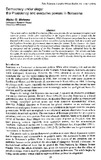| dc.contributor.author | Molomo, M.G. | |
| dc.date.accessioned | 2011-10-17T10:25:27Z | |
| dc.date.available | 2011-10-17T10:25:27Z | |
| dc.date.issued | 2000 | |
| dc.identifier.citation | Molomo, M.G. (2000), Democracy under siege: the Presidency and executive powers in Botswana, Pula: Botswana Journal of African Studies, Vol.14, No. 1, pp. 95-108 | en_US |
| dc.identifier.uri | http://hdl.handle.net/10311/897 | |
| dc.description.abstract | This article outlines that the Constitution of Botswana provides for an executive presidency with
extensive powers. Unlike other constitutions in the region where power is vested with the people, in Botswana it is vested with the President. While democratic procedures have not been flaunted in Botswana, in a situation where one political party dominates both the executive and the legislative branches of government, there is cause for concern. In this situation, the checks and balances provided for in the constitution are almost redundant. The declaration of the state of emergency and the granting of the Vice-President, Ian Khama, sabbatical leave by the
President are examples where the President used his executive powers. This article concludes
that given the wide-ranging executive powers that the President enjoys, there is a strong case for presidential elections. In that way, the president would be directly elected by the electorate
and therefore directly accountable to them. | en_US |
| dc.language.iso | en | en_US |
| dc.publisher | Pula: Botswana Journal of African Studies | en_US |
| dc.subject | Democracy Botswana | en_US |
| dc.subject.lcsh | Democracy--Botswana | en_US |
| dc.title | Democracy under siege: the Presidency and executive powers in Botswana | en_US |
| dc.type | Published Article | en_US |
| dc.link | http://archive.lib.msu.edu/DMC/African%20Journals/pdfs/PULA/pula014001/pula014001011.pdf | en_US |

